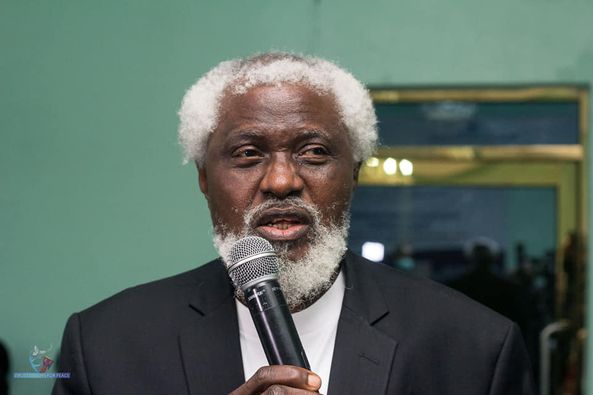Encounter with Ola Makinwa, Africa’s iconic peace ambassador

- Prof Ola Makinwa
Before now, I have heard so much about Ola Makinwa, the iconic Professor of Dramatic Arts, a doyen of the film and theatre industry, world-class academic and author of many books, including the much-talked about compendium, Peace Culture. But I never met him.
Here is a man with over 76 celluloid film directing experience, 480 video movies and 163 television series in addition to attending over 450 seminars and conferences , including film, cultural, drama and music festivals, garnering over 300 awards and honours locally and internationally, and who remains one of the few heroes of the FESTAC ’77.
But these giant feats probably don’t define him as much as his quest for peace in Africa, a risky gambit which earned him death sentence in Liberia. In a sense, I encountered Prof Makinwa in a very personal way through the death sentence saga about a decade ago when I first heard the story and ever since, I had made futile attempts to meet him physically until last Saturday, a day after his 74th birthday. The encounter in Abuja was fortuitous and a story for another day.
But for his Soyinka-like grey hairs, you would hardly know that Prof Ola Makinwa is 74 already. Gangling, sprightly and full of youthful, vibrant energy, he was engaging and intellectually sophisticated but to the discerning, it was also apparent that he was burdened.
Prof Makinwa is sad that most African countries are still badly governed, a veritable recipe for crisis, he laments. “I just discovered lately that Africa as a whole is having the same problem of bad governance with the attendant turmoil.”
But he didn’t quite come to that realisation lately. Other than his passion for theatre which started from childhood, nothing else has occupied Prof Makinwa in all his adult life more than the quest for peace in Africa, which sprouted from his ugly experience in Liberia in 1995.
The fascinating, yet blood-curdling story of his arrest, trial and death sentence can only be imagined. To appreciate why he became an African Peace ambassador, the story needs to be retold and he is not tired of telling it.
“In the mid-1990s,” he began, “I really wanted to know where Africa was headed and when I became the cultural ambassador for Britain, I left London for Germany to buy a caravan which I drove through the Sahara Desert enroute Nigeria. I drove from Morocco to Mali, crossed over to Burkina Faso and to Liberia. I just want to tell you how I came about the African Peace Project.”
READ ALSO: Onyeka Onwenu is dead
Omolola Oloworaran: Financial round peg in PenCom’s round hole
When Prof Makinwa and his two subordinates, Kaka and Alaba Nwosu got to the Liberian border with Burkina Faso, the Charles Taylor-led National Patriotic Front of Liberia (NPFL) militia refused them entry on the excuse that the country was in the middle of a brutal war. That was in 1995.
But he didn’t budge, insisting that he was a cultural ambassador of Britain on a tour of African countries for exhibitions. The standoff lasted for about seven hours before they let them in. But shortly after, they were arrested and the nightmare ensued.
“As we were driving, these militia boys accosted us and said they were arresting us,” he explained. They were accused of being spies even after they produced their travel documents to prove otherwise. The arrest led to a 34-day detention. Then one day, when they thought they had been forgotten, they were hauled before a tribunal for trial on a charge of espionage.
Prof Makinwa still remembers vividly. “Charles Taylor headed the panel and he condemned us to death and they took us back to the cell to await execution. If you were a Liberian then, when you are arrested, they will chop off your two hands and allow you to go. The idea is to ensure that you won’t be able to carry guns again. But in our own case, because we were foreigners, they could not do that to us having seen our British documents. But what they did by condemning us to death by firing squad was even worse.
“We were in the cell for two months and I kept telling the guy who was bringing us food that we were not spies. I remember him telling us after one month that he was going to tell one of their senior officers to see me. When eventually the officer came, I once again pleaded our innocence, reminding him that we were fellow Africans on a cultural trip because of our love for the continent.
“So, I think he went back to re-present our case and after one month, they called us for a retrial and this time, Charles Taylor said because of the travel documents we had and because we were not living in the country and no arms were found on us, we should be allowed to go. He discharged and acquitted us.”
But rather than come back to Nigeria, Prof Ola Makinwa proceeded to Monrovia and on the way he had his road to Damascus experience after seeing corpses, in different stages of decomposition, littering the entire stretch on both sides of the road.
He convinced himself on the need to seek audience with President Samuel Doe and convince him to end the brutal war by taking the asylum offered him by most Western countries. After three days in a government guest house in Monrovia, his request to see the President was granted.
In his own words, “At my request, President Doe’s Chief of Staff came and booked appointment for me to see him. I went with Alaba and as soon as we were ushered into his office, I said, ‘Your Excellency, you will be one of the greatest African leaders if you can take the part of honour, accept the amnesty proposals and leave Liberia. I told him about the uncountable number of corpses that littered the roads on my way to Monrovia.”
If he had any expectations, they were dashed as soon as Doe spoke. “Do I tell you the truth?” he asked and when Makinwa answered in the affirmative, he retorted, “This is my country and I am in charge and I am going nowhere.”
When Prof Makinwa reiterated the horror he saw on the road, Doe confessed that he had also heard about it but insisted that Charles Taylor was to be blamed and not him, assuring his flustered guest that the rebel leader was only wasting his time, killing the people for nothing, even as he knew the futility of his action.
Failing in his self-assigned peace mission having escaped death by the whiskers himself, Prof Makinwa left Liberia for Nigeria but what he saw in the war-thorn country made him a peace advocate.
“We must work on peace for Africa, for the peaceful co-existence of the African people,” he says. Yet, he is the first to admit that “it is an extremely difficult task because some of these leaders you see are not even peaceful people. They are not interested in peace. They are oblivious of the fact that peace is a weapon that can foster unity.”
But that hasn’t deterred him. After setting up the African Peace Foundation, a custodial of intellectual heritage, he went visiting African leaders; first to Col. Muammar Gadhafi in Tripoli in 1996. The Libyan leader embraced the project and pledged $500,000, which they never collected, not because Gadhafi reneged but because of leadership intrigues in Africa and Western manipulation and interference. Nelson Mandela whom he visited in prison, not only welcomed the idea but offered, without any prompting, to be the grand patron now as President. That was also in 1996. Kenneth Kaunda of Zambia jumped at the idea and so did Jerry Rawlings of Ghana. But Zimbabwean President Robert Mugabe objected on the ground that it had Western support.
If all these leaders acquiesced, why has peace continued to elude the continent? At the heart of the conflicts in Africa is the lack of good governance, the very reason why Nigerians are today plumbing the depths of misery under President Bola Tinubu’s watch and why the beleaguered youths are threatening to shut down the country in massive protests from today.
On Tinubu, Prof Makinwa posits: “Tinubu’s administration is an eyesore. He might have good intention but what is the intention of those who surround him? Their own reason for being in government is to grab. As it is now, what is killing this country is corruption. We have ICPC and EFCC. In the last one year, what has the EFCC done? That shows you that the cankerworm of corruption has eaten deep.”
If the economy is thriving and people are able to feed, the unemployed secure jobs, and there is quality education and good healthcare for all, there will be peace in Africa generally and Nigeria in particular, he asserts.
But as dispiriting as the situation is, Prof Ola Makinwa, founder of the popular World Black Films in London, African Peace Institute and proprietor of African Peace Polytechnic is undeterred. And at 74, there is no slowing down. Believing as he does that nothing is impossible, he is driving a proposed African Peace University. The product of his tenacity is the book, Peace Culture: A Monumental Evidence for Global Co-existence, which will be the focus of this column next week.







